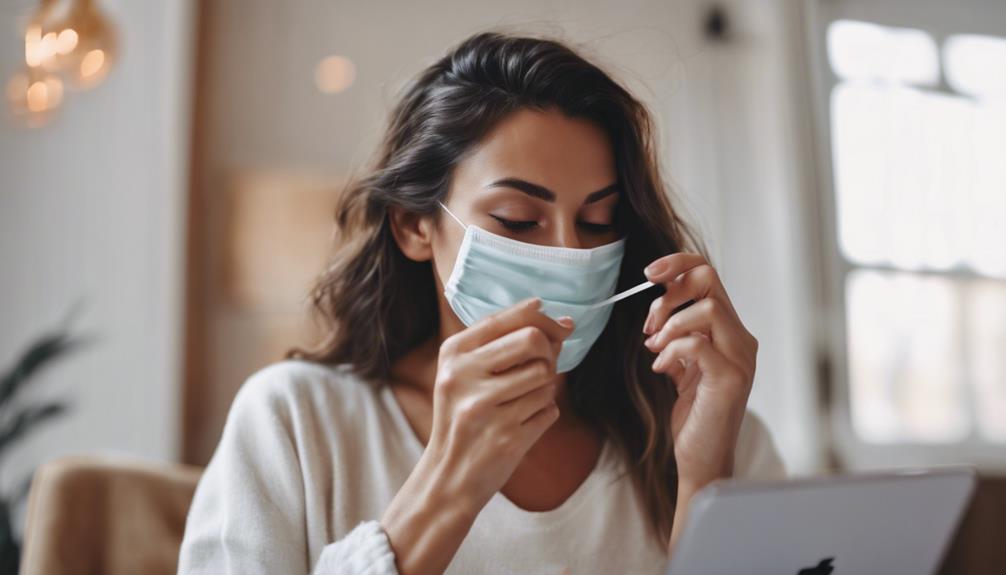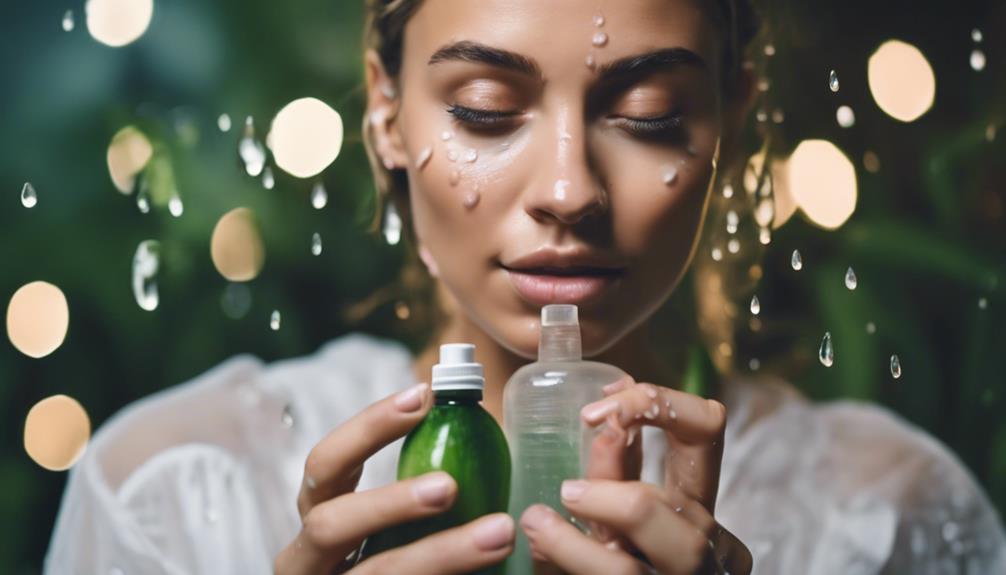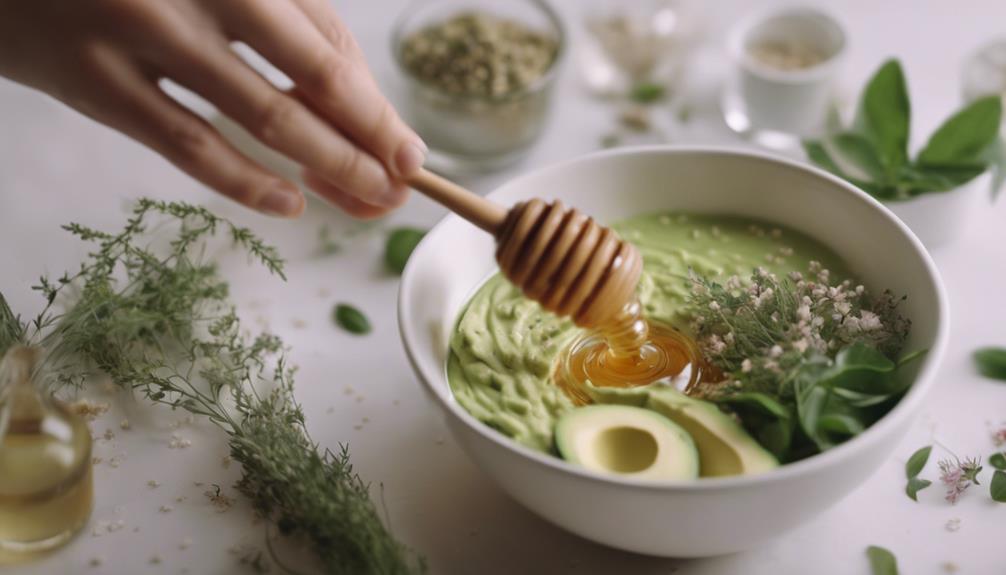When life throws you hectic schedules and demanding days, wouldn't it be wonderful to have skincare solutions that fit seamlessly into your routine? Imagine effortlessly crafting nourishing masks and rejuvenating toners in the comfort of your own home. These quick DIY methods offer more than just convenience; they hold the secret to revealing your skin's natural radiance. Discover the secrets behind why opting for these efficient homemade remedies might just be the key to unleashing your skin's natural radiance.
Time-Saving Benefits of DIY Skincare

When incorporating DIY skincare methods into your routine, you can save time without compromising the quality of your self-care regimen. Time management plays an important role in our daily lives, and skincare routines are no exception. By opting for efficient beauty hacks through DIY skincare, you can streamline your routine and achieve glowing skin without spending excessive time or money.
One of the key benefits of DIY skincare is its effectiveness. With simple ingredients that are often readily available at home, you can create effective skincare products in a matter of minutes. This eliminates the need for elaborate trips to the store or waiting for online deliveries, making your skincare routine more time-effective.
Moreover, DIY skincare allows you to personalize your products according to your skin type and concerns. This customization ensures that you're using products tailored to your specific needs, enhancing the effectiveness of your skincare routine. By incorporating DIY methods, you not only save time but also elevate your self-care regimen to new heights.
Common Ingredients for DIY Skincare
Understanding how to incorporate key ingredients for DIY skincare is crucial in transforming your beauty routine into a personalized and effective self-care experience. Essential oils are a popular choice for DIY skincare due to their various benefits. For instance, tea tree oil is renowned for its antibacterial properties, making it excellent for acne-prone skin. Lavender oil aids in soothing and calming irritated skin, particularly beneficial for sensitive skin types. The inclusion of essential oils like rosehip oil can assist in rejuvenating and hydrating the skin.
When contemplating DIY skincare ingredients, having a grasp of how they can elevate your skincare routines and overall effectiveness is paramount. Ingredients like aloe vera gel can deliver hydration and soothing effects, while honey is recognized for its antibacterial and moisturizing properties. Incorporating ingredients such as green tea extract, which is abundant in antioxidants, can help shield the skin from environmental stressors.
Easy Homemade Face Masks

When it comes to easy homemade face masks, you have a plethora of natural ingredients at your disposal, each offering unique benefits for your skin.
Homemade masks not only provide a cost-effective skincare option but also allow you to customize ingredients based on your skin's specific needs.
To guarantee maximum effectiveness, remember to follow application tips like applying on clean skin and avoiding sensitive areas around the eyes.
Natural Ingredients for Masks
Crafting your own homemade face masks can be a rewarding and beneficial way to nourish your skin using natural ingredients. Fruit extracts, such as those from berries, papaya, or citrus fruits, are rich in vitamins and antioxidants that can help brighten and revitalize your skin.
Herbal infusions, like chamomile, green tea, or lavender, offer soothing and anti-inflammatory properties that can calm irritated skin. When creating your DIY face masks, consider incorporating these natural ingredients for their skin-loving benefits.
Experiment with different combinations of fruits and herbs to find the perfect mask that suits your skin type and addresses your specific skincare needs. Enjoy the process of creating personalized masks that are free from harsh chemicals and full of nature's goodness.
Benefits of Homemade Masks
Enhance your skincare routine with easy homemade face masks that offer a multitude of benefits for your skin. Homemade masks provide moisturizing benefits and soothing properties that can help improve the overall health and appearance of your skin. Here are three key benefits of incorporating homemade masks into your skincare regimen:
- Moisturizing Benefits: Homemade masks often contain natural ingredients like honey, avocado, or yogurt, which are rich in hydrating properties. These ingredients can help lock in moisture, leaving your skin feeling soft and supple.
- Soothing Properties: Homemade masks can have calming effects on the skin, especially if they contain ingredients like oatmeal, aloe vera, or cucumber. These ingredients can help reduce inflammation, redness, and irritation, providing relief to sensitive skin.
- Nourishing Effects: Homemade masks can deliver essential nutrients directly to your skin, promoting a healthy complexion and addressing specific skin concerns like dryness, acne, or dullness.
Application Tips for Masks
For optimal results, apply your easy homemade face masks using gentle, circular motions to guarantee even coverage and absorption into the skin. This method ensures that the mask is evenly distributed on your face, maximizing its benefits.
Proper mask application is important in skincare routines as it allows the active ingredients to penetrate the skin effectively. By using circular motions, you're also promoting blood circulation, which can enhance the overall health and appearance of your skin.
These techniques not only help in achieving a more radiant complexion but also aid in relaxing facial muscles. Remember, taking the time to apply masks correctly can greatly improve their efficacy and contribute to healthier skin in the long run.
DIY Scrubs for Glowing Skin

To achieve radiant and healthy skin, consider incorporating homemade scrubs into your skincare routine. DIY scrubs not only help in exfoliating dead skin cells but also promote a glowing complexion. Here are three essential tips for creating DIY scrubs for glowing skin:
- Exfoliating benefits: Homemade scrubs are effective in removing dead skin cells, unclogging pores, and promoting cell turnover, which can result in smoother and brighter skin. Ingredients like sugar, salt, coffee grounds, or oatmeal can be used as natural exfoliants in DIY scrubs.
- Hydration tricks: Incorporating hydrating ingredients like honey, yogurt, aloe vera, or coconut oil in your DIY scrubs can help nourish the skin while exfoliating. These ingredients can provide moisture, soothe the skin, and enhance the overall radiance of your complexion.
- Antioxidant boost: Adding ingredients rich in antioxidants such as green tea, vitamin E oil, or fruits like berries can help protect the skin from environmental damage and premature aging, leaving your skin looking vibrant and youthful.
Natural Remedies for Acne
Looking for natural remedies to combat acne?
Discover the power of acne-fighting ingredients and learn how to create effective DIY acne treatments at home.
Say goodbye to stubborn breakouts with these simple yet potent solutions.
Acne-Fighting Ingredients
Effective natural remedies for acne include ingredients like tea tree oil, witch hazel, and aloe vera. These ingredients are known for their ability to combat acne-causing bacteria, reduce inflammation, and soothe the skin.
Here are three acne-fighting ingredients you can incorporate into your skincare routine:
- Tea Tree Oil: Known for its antimicrobial properties, tea tree oil can help reduce acne breakouts and inflammation.
- Witch Hazel: Witch hazel acts as a natural astringent, helping to cleanse the skin and reduce oil production, making it beneficial for those with oily skin.
- Aloe Vera: Aloe vera is renowned for its soothing and healing properties, making it effective in calming irritated skin and reducing acne scars.
DIY Acne Treatments
When it comes to tackling acne at home, utilizing natural remedies can be a beneficial and cost-effective option for improving your skin's health and appearance.
For spot treatment, applying a dab of tea tree oil or aloe vera gel directly onto the affected area can help reduce inflammation and kill acne-causing bacteria.
Overnight remedies like a honey and cinnamon mask or a clay mask can work wonders in calming active breakouts.
For DIY scar reduction and skin healing, consider using ingredients like rosehip oil, which is rich in antioxidants and essential fatty acids that promote skin regeneration.
Remember to patch-test any new ingredient and be consistent with your routine to see the best results in managing acne.
Hydrating DIY Toners and Mists

Consider integrating invigorating DIY toners and mists into your skincare routine to maintain your skin hydrated and rejuvenated. These homemade remedies can provide a revitalizing boost to your skin while helping preserve its moisture balance.
Here are three essential aspects to contemplate:
- Hydrating Mist Recipes: Crafting your hydrating mist using natural ingredients like rose water, aloe vera, and glycerin can offer a quick and easy way to hydrate your skin throughout the day. These mists aid in replenishing moisture, soothing irritation, and giving your skin a radiant glow.
- Skin Benefits: DIY toners and mists can offer various skin benefits such as tightening pores, balancing pH levels, and enhancing the overall texture of your skin. By integrating these into your routine, you can promote healthier and more hydrated skin.
- DIY Toner Techniques: Experiment with different toner recipes that include ingredients like witch hazel, green tea, or apple cider vinegar. These toners can assist in removing excess oil, dirt, and residue from your skin, leaving it feeling clean and revitalized.
Quick Fixes for Under-Eye Bags
To reduce the appearance of under-eye bags, incorporating simple lifestyle changes and targeted skincare products can be beneficial. Instant results can be achieved by using products containing ingredients like caffeine, hyaluronic acid, or peptides, which can help reduce puffiness and tighten the skin temporarily.
However, for long-term effects, it's important to address underlying causes such as lack of sleep, dehydration, or allergies. Natural alternatives like applying cold cucumber slices, chilled tea bags, or aloe vera gel can also provide quick relief and reduce inflammation.
These remedies aren't only affordable options but can also soothe the under-eye area and improve circulation. Remember that consistency is key when dealing with under-eye bags, so establishing a good skincare routine and practicing healthy habits will yield better results over time.
DIY Solutions for Radiant Skin

Achieve a glowing complexion with simple and effective DIY methods for radiant skin. If you want to enhance your skin's radiance without breaking the bank, consider these tips:
- Skin Brightening: Create a natural skin brightening mask using ingredients like yogurt, honey, and lemon. Yogurt contains lactic acid that gently exfoliates and brightens the skin, while honey is a humectant that helps retain moisture. Lemon, rich in vitamin C, can help lighten dark spots and even out skin tone. Mix these ingredients, apply the mask to your face, leave it on for 15-20 minutes, and rinse off with lukewarm water for a brighter complexion.
- DIY Exfoliation: Make a homemade sugar scrub by mixing sugar with coconut oil. Sugar is a gentle exfoliant that helps remove dead skin cells, while coconut oil moisturizes and nourishes the skin. Gently massage the scrub onto your face using circular motions, then rinse off to reveal smoother and more radiant skin. Remember to exfoliate only 1-2 times a week to avoid irritation.
Frequently Asked Questions
Can DIY Skincare Methods Cause Skin Irritation or Allergies?
Proper patch testing is essential when trying DIY skincare methods. Allergies can be triggered by various ingredients, leading to irritation.
Quick results may not always mean safe results. Always check for potential allergens in the ingredients you use.
If you experience any irritation or suspect an allergic reaction, stop using the product immediately and consult a dermatologist. Your skin's health is a priority, so take precautions to avoid any adverse effects.
How Often Should DIY Face Masks Be Used for Optimal Results?
For best results, you should use DIY face masks consistently. Frequency recommendations vary depending on skin type, but generally, 1-2 times a week is a good starting point.
Consistency is key as it allows your skin to reap the benefits of the ingredients. DIY masks offer customization options, allowing you to tailor them to your specific needs.
Experiment with different ingredient variations to see what works best for your skin.
Are There Specific Ingredients to Avoid in DIY Skincare Products?
When making your own skincare products, it's essential to avoid harmful ingredients that can irritate your skin. Some common ones include synthetic fragrances, sulfates, parabens, and formaldehyde-releasing preservatives.
Always opt for natural, gentle ingredients like aloe vera, honey, and coconut oil. Precautions like patch testing new ingredients and following recipes carefully can help prevent adverse reactions.
Prioritize your skin's health by being mindful of what goes into your DIY skincare creations.
Can DIY Scrubs Damage the Skin Barrier or Cause Microtears?
When using DIY scrubs, be cautious about potential skin damage. Improper exfoliation techniques can harm your skin barrier, leading to microtears. Opt for gentle exfoliants over aggressive methods like microdermabrasion.
Choose natural ingredients and avoid harsh chemicals to prevent irritation and maintain skin health. Essential oils can offer benefits without causing harm. Prioritize your skin's well-being by being mindful of the products you use for exfoliation.
What Are the Potential Risks of Using DIY Remedies for Acne?
When it comes to DIY acne treatments, it's important to understand the risks involved. While homemade remedies can be effective for some, they may not always be safe.
Risks of using homemade acne remedies include potential skin irritation, allergic reactions, and exacerbation of existing skin conditions. It's essential to research ingredients thoroughly and perform patch tests before applying DIY treatments to guarantee their safety and effectiveness for your skin.
Conclusion
To sum up, opting for quick DIY skincare methods not only saves time but also allows for personalized and effective skincare solutions.
By incorporating common ingredients like essential oils, aloe vera, and honey, one can easily create face masks, scrubs, acne remedies, toners, mists, and more for healthier, glowing skin.
Embracing DIY skincare promotes a natural approach to skincare, making it a convenient and beneficial choice for those seeking radiant skin.
